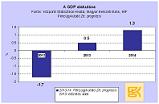| Contact |  |
 |
You are here
Home ›Budapest Transport Company: from a large socialist enterprise to a market oriented company
(Experiments, results and drawbacks)
Public transport in large cities is a problem all over the world, for passengers, politicians running the city, and experts organising the network. What kind of structural features cause these difficulties? Where did the service provider and the company owner seek a way out? What results have there these steps achieved and what drawbacks have they faced? As well as information available to the public, the answers are based on an analysis of company documents and the experience gained as a participating observer or in some cases as a participant in decision making. Having analysed the attempts at transformation, the stabilisation and reorganisation schemes over the last ten years, the study has drawn the conclusion that the attempts have not resulted in long-term solutions. The most important result is that the attempt itself was made, partly because various representatives of the owner and the company management have thoroughly considered the reasons for the difficulties and their direct and long-term consequences. On the other hand, even the restricted result of the attempts is a result. It has become clear that no breakthrough can be expected from the changes implemented so far. If the owner and the company wish to provide a permanent, long-term solution to the now chronic problems, they must take more decisive action than they have so far.
In: A Budapest-modell, Egy liberális várospolitikai kísérlet, Szerk. Pallai Katalin, Nyílt Társadalom Intézet Alapítvány (The Budapest model. A liberal urban policy experiment. Ed. Katalin Pallai, Foundation of Open Society Institute) 2003, pp. 257-282
| Attachment | Size |
|---|---|
| 244.32 KB | |
| 288.58 KB |
Financial Research Plc.
IKU Innovation Research Centre
News and events
Working Paper Series
-
11/26/2011 - 15:38
-
11/25/2011 - 16:00
-
11/18/2011 - 20:00
-
08/20/2011 - 15:31
-
07/18/2011 - 19:53



